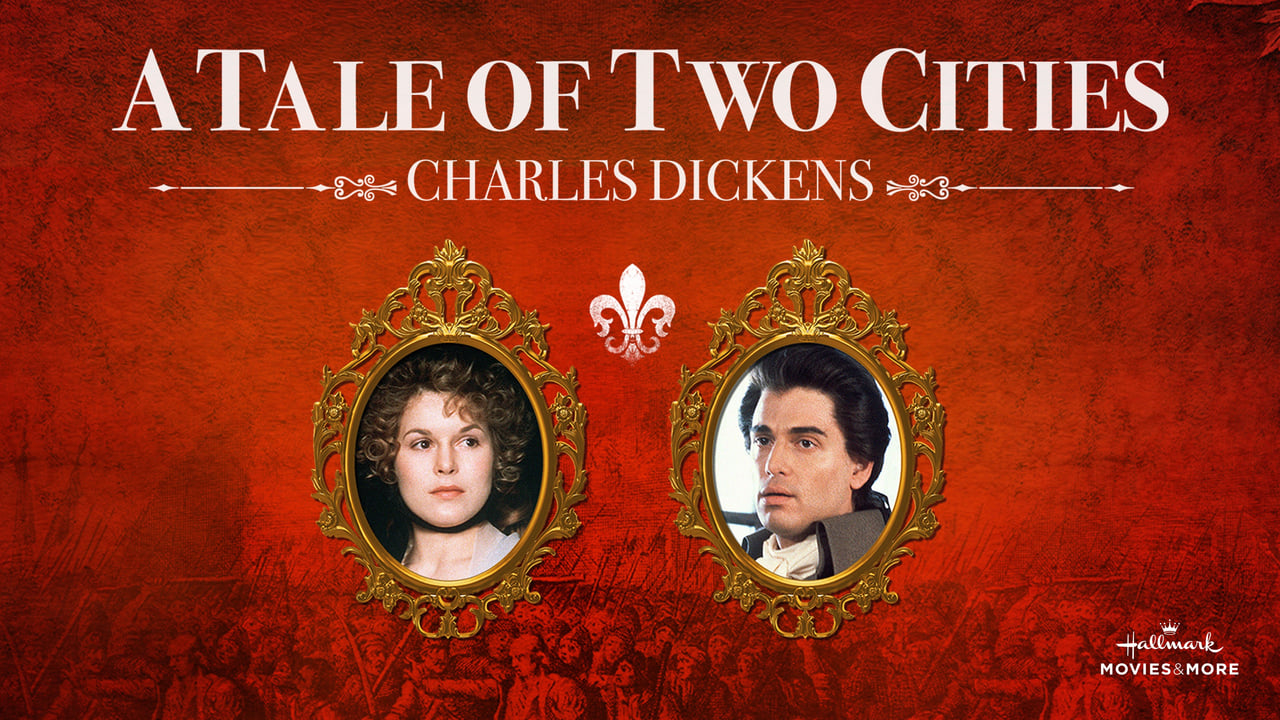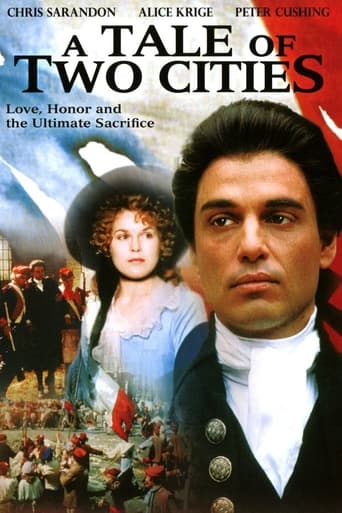BelSports
This is a coming of age storyline that you've seen in one form or another for decades. It takes a truly unique voice to make yet another one worth watching.
Keeley Coleman
The thing I enjoyed most about the film is the fact that it doesn't shy away from being a super-sized-cliche;
Payno
I think this is a new genre that they're all sort of working their way through it and haven't got all the kinks worked out yet but it's a genre that works for me.
Allissa
.Like the great film, it's made with a great deal of visible affection both in front of and behind the camera.
jason-210
A reasonably good interpretation of the Dickens classic, which sticks to the book quite well.Some of the acting was excellent, in particular Chris Sarandon who was perfectly cast as Sydney Carton / Charles Darnay. His portrayal of the complex Carton in particular was very clever and convincing. Cushing also was well cast as Manette and played it perfectly, while Kenneth Moore delivered his role competently was one would expect.Unfortunately the film is marred by poor, low budget 1970s television production and art direction values. It is mostly unconvincing in its portrayal of the revolution, especially the action scenes. One of the problems with early television adaptations, especially those by the BBC from the 1960s and 70s, is that they think "dramatising" means simply adding pictures to text. They assumed that if you were faithful to the events and dialog, and dressed people up in period costume, then you've done a good job. The storming of Bastille seems like a routine amateur theatrical depiction, where the extras clearly had a minimum of choreography and direction. There just weren't enough revolutionaries to create a convincing atmosphere of chaos and terror. These problems were further exacerbated by the stereotyping and poorly acted roles of the key revolutionaries Monsieur and Madame Defarge.The ending has one notable and moving scene - the meeting and very brief love encounter between Carton and Seamstess before the guillotine, again made possible by the Sarandon's excellent portrayal of Carton.At the time of writing the film is currently available in a boxed set of three DVDs in the "Best British Classics" series in Sweden. The the series is designed for Swedish audiences but the films are in English with the option of subtitles. A quick search on the Internet on Google.se for "Best British Classics" should give you some hits.
notperfect_justloved
I thought this was an incredible movie, especially for being an '80's movie. Most movies from the '80's hardly impress me, but this was an undoubtable exception. We watched this in my history class and I was honestly shocked at the emotion and feeling put into every part and the realism represented by the film-makers. Very historically correct, which especially impressed me. It was a very good representation of Dickens' wonderful book, which I read last summer and plan on reading again as a result. I was literally in tears, and in front of my history class, too! It was very moving and aroused a feeling of sympathy in my heart. The theme of absolute love was shown well and made a great impact. Wonderful movie. I thoroughly enjoyed it and was surprised just how closely it followed the book and history as well.
Hans C. Frederick
Seeing as how this was made for television,we need to judge this particular production and the standards required for that medium.For the most part,the cast is very competent.Indeed,Peter Cushing does better as the doctor than ANYONE else that I've seen.Carton,Darnay,Lucy,and the supporting parts are all quite capable.And Kenneth More does a fine job as Mr. Lorry.(Has anyone ever commented on the fact that he's starting to sound and look like Basil Sydney?)Robson is a worthy successor to Oliver.I had trouble recognizing Suchet as Barsad.The actor playing Defarge come across as depressed and somber,and this isn't quite right.Defrage is a hulking,wounded,inarticulate animal,caught between love and loyalty to his former master,and devotion to his cause.And Madame Defarge is a fat,flabby,clumsy,nasty snake,lacking the fire of Blanche Yurka.Her scenes at the fight and fall of the Bastille were totally unconvincing.And why did they trim down the role of Jerry Cruncher?That sly, funny rogue is perfect for the talents of that splendid character actor George Innes.Still,it's a worthy effort,and a nice way to see a new slant on the story.
kwongers
First things first: I have to say I have never read Charles Dicken's book, but after seeing this movie, I'll be stopping by the state library to pick it up. This is a GREAT movie - enjoyable, moving, and historically convincing. (My history teacher made us watch it to see what the French Revolution (especially the Reign of Terror) was like.)
After reuniting with her father, Dr. Manette (they had been separated from each other for many years), Lucie Manette goes back to England, where she meets a handsome stranger, Charles Darnay. Darnay is really Charles Evremonde, a French aristocrat who disdains his vain and arrogant uncle and who runs away from France. They fall in love and marry. But there is an English lawyer, Sydney Carton, who also loves Lucie. When Darnay returns to France to save his servant, he is thrown into prison and besieged by all the foolishness and speculation of the French Revolution. I won't divulge any more of the story to you.but I have to say the ending is really, really great. It's so moving that I can't watch it without crying at least a little. (Yeah, I cried when we were watching it at school, and hopefully no one saw me.)For others who know the story, I can't tell you if the movie lives up to the book, but I do think the movie is a very convincing depiction of what happened during the French Revolution. Madame DeFarge, one of the `revolutionaries' (ha!), embodies the spirit of the common people during the Revolution. She felt it was absolutely necessary to kill a lot of nobles, even if they were innocent and had done nothing wrong. In the court scenes, we see how unfair the French tribunals are; defendants are barely given the chance to speak and they are convicted on little evidence and a lot of speculation. (The film compares the French court to the English court, which is infinitely more just.) We see the so-called anti-Revolutionaries being marched to the guillotine.it's a very moving moment. The film works very well because it doesn't lose any part of the story or the historical background. They work very nicely together.To single out someone for acting, I have to commend the talented Chris Sarandon, who played Sydney Carton and Charles Darnay. That must have been really hard to do, especially since Darnay gets everything he wants and Carton doesn't. It's great acting. However, Sarandon manages to stay on course and the results are wonderful. He manages to combine jealousy, love, and strength all in the same gaze.
A WONDERFUL film.it gets your anger going, pulls on your heartstrings, and keeps you perfectly enraptured through the entire running time. I loved this movie. 10/10


